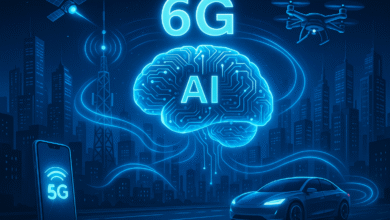
Quantum computing stands at the forefront of technological advancement, promising unparalleled processing power and capabilities. In this article, we delve into the recent breakthroughs in quantum computing, exploring its potential applications and the future it holds.
Read More: The Quantum Frontier: Unlocking the Power of Quantum Computing
Introduction to Quantum Computing

What is Quantum Computing?
Quantum computing is a revolutionary field of computing that harnesses the principles of quantum mechanics to perform computations. Unlike classical computing, which relies on bits to represent information as either 0s or 1s, quantum computing utilizes quantum bits or qubits. These qubits can exist in multiple states simultaneously, thanks to the phenomenon known as superposition, allowing quantum computers to perform parallel computations and potentially solve complex problems much faster than classical computers.
How Does Quantum Computing Differ from Classical Computing?
The fundamental difference lies in the way data is processed. Classical computers execute instructions sequentially, processing one piece of information at a time. In contrast, quantum computers exploit quantum superposition and entanglement to perform computations on vast amounts of data simultaneously. This parallelism enables quantum computers to tackle problems exponentially faster than classical computers for certain tasks.
Quantum Computing Breakthroughs
Recent Advancements in Quantum Hardware
In recent years, there have been significant advancements in quantum hardware, which have propelled the field forward. Researchers have made strides in improving qubit coherence and error correction, crucial for building reliable quantum processors. Breakthroughs in materials science and fabrication techniques have led to the development of more stable qubits, laying the foundation for scalable quantum systems.
Breakthroughs in Quantum Algorithms
Alongside hardware improvements, breakthroughs in quantum algorithms have expanded the capabilities of quantum computing. Algorithms such as Shor’s algorithm for integer factorization and Grover’s algorithm for database search demonstrate the potential for quantum supremacy—solving problems that are practically intractable for classical computers within feasible timeframes.
Applications of Quantum Computing
Quantum Cryptography
One of the most promising applications of quantum computing is in the field of cryptography. Quantum cryptography leverages the principles of quantum mechanics to secure communication channels. Quantum key distribution protocols offer cryptographic keys that are immune to eavesdropping, providing unparalleled security for sensitive data transmission.
Drug Discovery and Material Science
Quantum computing holds immense promise in accelerating drug discovery and material science. Quantum simulators can accurately model molecular structures and interactions, facilitating the design of novel drugs and materials with tailored properties. The ability to simulate quantum systems opens new avenues for scientific research and innovation in these fields.
Optimization Problems and Machine Learning
Quantum computing excels in solving optimization problems and enhancing machine learning algorithms. Quantum annealing and variational quantum algorithms offer efficient solutions to combinatorial optimization tasks, revolutionizing fields such as logistics, finance, and artificial intelligence. Quantum-enhanced machine learning algorithms promise to unlock new insights from vast datasets, driving advancements in predictive analytics and pattern recognition.
Challenges and Limitations
Quantum Decoherence
Despite the promising advancements, quantum decoherence remains a significant challenge in realizing practical quantum computers. Interactions with the environment cause qubits to lose their quantum properties, leading to errors in computation. Mitigating decoherence requires sophisticated error correction techniques and robust quantum control protocols, posing a formidable obstacle to scaling quantum systems.
Scalability Issues
Scalability is another hurdle on the path to widespread adoption of quantum computing. While researchers have made strides in building small-scale quantum processors, achieving fault-tolerant, error-corrected quantum computers with hundreds or thousands of qubits remains a formidable task. Overcoming scalability limitations necessitates breakthroughs in hardware design, error correction, and system integration.
Future Implications

Quantum Supremacy and Beyond
As quantum hardware continues to improve, achieving quantum supremacy—a point where quantum computers outperform classical computers on certain tasks—is within reach. Beyond quantum supremacy, the potential applications of quantum computing are vast and varied. From simulating complex quantum systems to optimizing supply chains and revolutionizing cryptography, quantum computing promises to reshape industries and drive innovation.
Impact on Various Industries
The impact of quantum computing extends across various industries, from finance and healthcare to cybersecurity and logistics. Quantum algorithms offer solutions to optimization problems that are inherently difficult for classical computers, unlocking new efficiencies and capabilities. Industries that embrace quantum computing early stand to gain a competitive edge in a rapidly evolving technological landscape.
Read More: The UK’s Investment in Quantum Computing
Unique FAQs
- How does quantum computing differ from classical computing? Quantum computing leverages the principles of quantum mechanics, such as superposition and entanglement, to perform computations on vast amounts of data simultaneously. In contrast, classical computing processes data sequentially using bits represented as 0s or 1s.
- What are the potential applications of quantum computing? Quantum computing holds promise in various fields, including cryptography, drug discovery, optimization problems, and machine learning. It offers unparalleled processing power, enabling faster solutions to complex problems.
- What challenges does quantum computing face? Quantum computing faces challenges such as quantum decoherence, scalability issues, and the development of reliable quantum hardware. Overcoming these hurdles is essential for realizing the full potential of quantum computers.
- How close are we to achieving quantum supremacy? Quantum supremacy, the point at which quantum computers outperform classical computers on certain tasks, is within reach with recent advancements in quantum hardware and algorithms. However, achieving reliable and scalable quantum systems remains a significant milestone.
- What industries stand to benefit the most from quantum computing? Industries such as finance, healthcare, cybersecurity, and logistics stand to benefit the most from quantum computing. Quantum algorithms offer solutions to optimization problems and data analysis tasks that are crucial for driving innovation and efficiency in these sectors.
The Final Words
Quantum computing represents a paradigm shift in computational power, with the potential to revolutionize industries and solve previously intractable problems. Recent breakthroughs in quantum hardware and algorithms signal exciting progress toward realizing the full potential of quantum computing. As researchers continue to push the boundaries of what’s possible, we stand on the brink of a new era of computing, where the unimaginable becomes achievable.







